Managing People Module: Interview Selection Technique Essay
VerifiedAdded on 2022/12/01
|8
|2207
|85
Essay
AI Summary
This essay delves into the persistent popularity of interviews as a primary employee selection technique, even in light of research questioning their reliability, referencing Cooper, Robertson & Tinline (2003) and Shackleton & Newell (1991). The essay begins by acknowledging the interview's c...
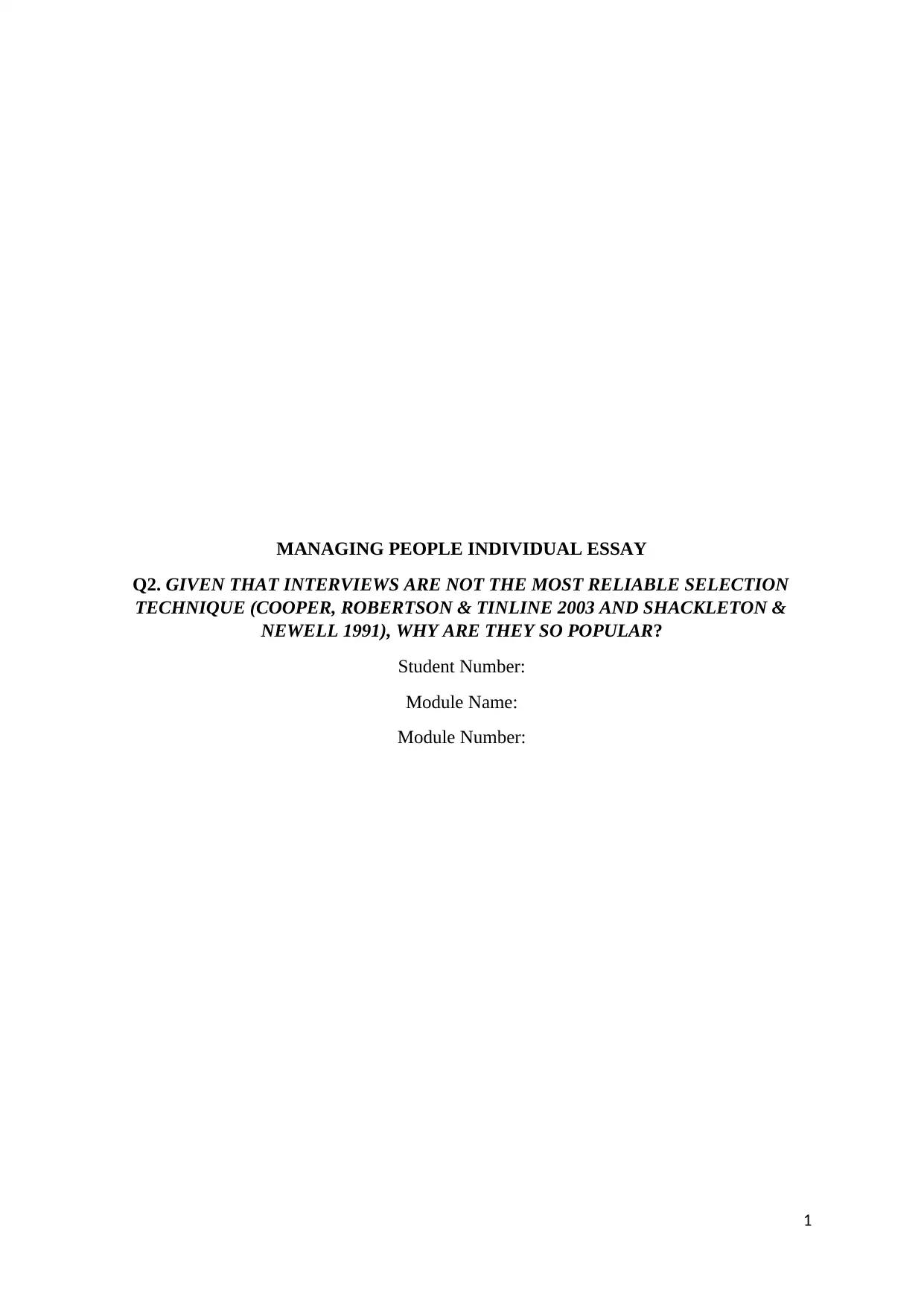
MANAGING PEOPLE INDIVIDUAL ESSAY
Q2. GIVEN THAT INTERVIEWS ARE NOT THE MOST RELIABLE SELECTION
TECHNIQUE (COOPER, ROBERTSON & TINLINE 2003 AND SHACKLETON &
NEWELL 1991), WHY ARE THEY SO POPULAR?
Student Number:
Module Name:
Module Number:
1
Q2. GIVEN THAT INTERVIEWS ARE NOT THE MOST RELIABLE SELECTION
TECHNIQUE (COOPER, ROBERTSON & TINLINE 2003 AND SHACKLETON &
NEWELL 1991), WHY ARE THEY SO POPULAR?
Student Number:
Module Name:
Module Number:
1
Paraphrase This Document
Need a fresh take? Get an instant paraphrase of this document with our AI Paraphraser
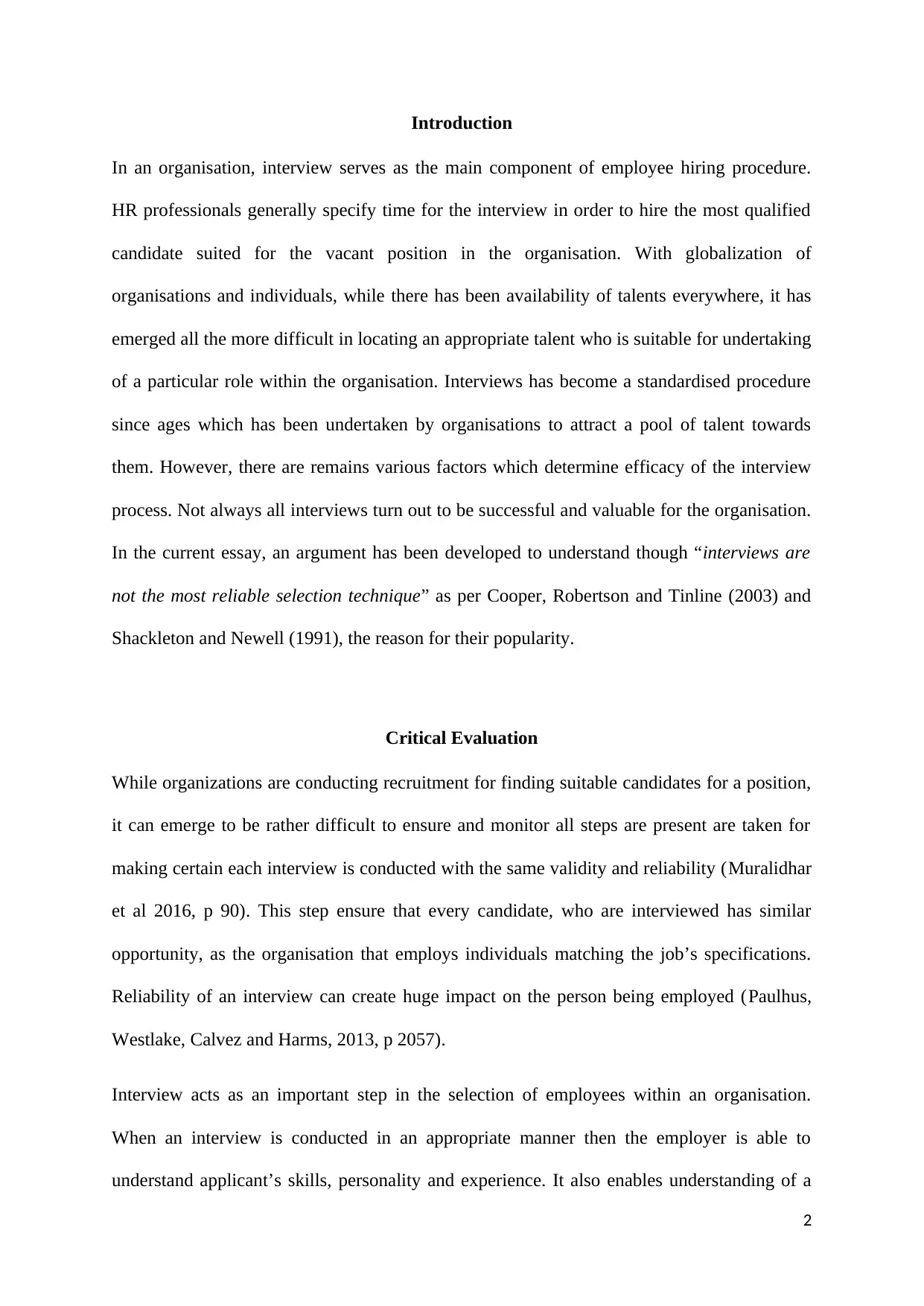
Introduction
In an organisation, interview serves as the main component of employee hiring procedure.
HR professionals generally specify time for the interview in order to hire the most qualified
candidate suited for the vacant position in the organisation. With globalization of
organisations and individuals, while there has been availability of talents everywhere, it has
emerged all the more difficult in locating an appropriate talent who is suitable for undertaking
of a particular role within the organisation. Interviews has become a standardised procedure
since ages which has been undertaken by organisations to attract a pool of talent towards
them. However, there are remains various factors which determine efficacy of the interview
process. Not always all interviews turn out to be successful and valuable for the organisation.
In the current essay, an argument has been developed to understand though “interviews are
not the most reliable selection technique” as per Cooper, Robertson and Tinline (2003) and
Shackleton and Newell (1991), the reason for their popularity.
Critical Evaluation
While organizations are conducting recruitment for finding suitable candidates for a position,
it can emerge to be rather difficult to ensure and monitor all steps are present are taken for
making certain each interview is conducted with the same validity and reliability (Muralidhar
et al 2016, p 90). This step ensure that every candidate, who are interviewed has similar
opportunity, as the organisation that employs individuals matching the job’s specifications.
Reliability of an interview can create huge impact on the person being employed (Paulhus,
Westlake, Calvez and Harms, 2013, p 2057).
Interview acts as an important step in the selection of employees within an organisation.
When an interview is conducted in an appropriate manner then the employer is able to
understand applicant’s skills, personality and experience. It also enables understanding of a
2
In an organisation, interview serves as the main component of employee hiring procedure.
HR professionals generally specify time for the interview in order to hire the most qualified
candidate suited for the vacant position in the organisation. With globalization of
organisations and individuals, while there has been availability of talents everywhere, it has
emerged all the more difficult in locating an appropriate talent who is suitable for undertaking
of a particular role within the organisation. Interviews has become a standardised procedure
since ages which has been undertaken by organisations to attract a pool of talent towards
them. However, there are remains various factors which determine efficacy of the interview
process. Not always all interviews turn out to be successful and valuable for the organisation.
In the current essay, an argument has been developed to understand though “interviews are
not the most reliable selection technique” as per Cooper, Robertson and Tinline (2003) and
Shackleton and Newell (1991), the reason for their popularity.
Critical Evaluation
While organizations are conducting recruitment for finding suitable candidates for a position,
it can emerge to be rather difficult to ensure and monitor all steps are present are taken for
making certain each interview is conducted with the same validity and reliability (Muralidhar
et al 2016, p 90). This step ensure that every candidate, who are interviewed has similar
opportunity, as the organisation that employs individuals matching the job’s specifications.
Reliability of an interview can create huge impact on the person being employed (Paulhus,
Westlake, Calvez and Harms, 2013, p 2057).
Interview acts as an important step in the selection of employees within an organisation.
When an interview is conducted in an appropriate manner then the employer is able to
understand applicant’s skills, personality and experience. It also enables understanding of a
2
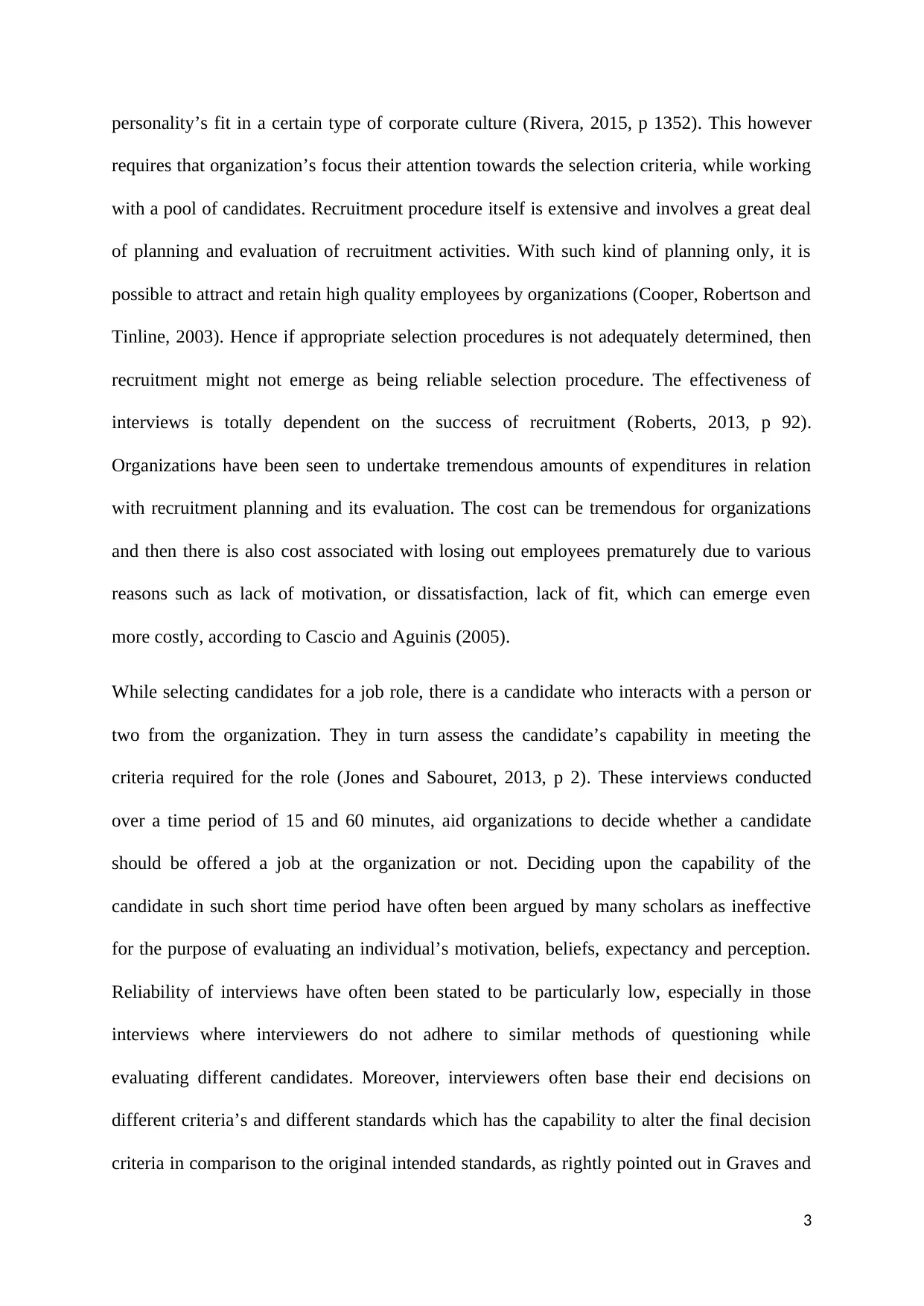
personality’s fit in a certain type of corporate culture (Rivera, 2015, p 1352). This however
requires that organization’s focus their attention towards the selection criteria, while working
with a pool of candidates. Recruitment procedure itself is extensive and involves a great deal
of planning and evaluation of recruitment activities. With such kind of planning only, it is
possible to attract and retain high quality employees by organizations (Cooper, Robertson and
Tinline, 2003). Hence if appropriate selection procedures is not adequately determined, then
recruitment might not emerge as being reliable selection procedure. The effectiveness of
interviews is totally dependent on the success of recruitment (Roberts, 2013, p 92).
Organizations have been seen to undertake tremendous amounts of expenditures in relation
with recruitment planning and its evaluation. The cost can be tremendous for organizations
and then there is also cost associated with losing out employees prematurely due to various
reasons such as lack of motivation, or dissatisfaction, lack of fit, which can emerge even
more costly, according to Cascio and Aguinis (2005).
While selecting candidates for a job role, there is a candidate who interacts with a person or
two from the organization. They in turn assess the candidate’s capability in meeting the
criteria required for the role (Jones and Sabouret, 2013, p 2). These interviews conducted
over a time period of 15 and 60 minutes, aid organizations to decide whether a candidate
should be offered a job at the organization or not. Deciding upon the capability of the
candidate in such short time period have often been argued by many scholars as ineffective
for the purpose of evaluating an individual’s motivation, beliefs, expectancy and perception.
Reliability of interviews have often been stated to be particularly low, especially in those
interviews where interviewers do not adhere to similar methods of questioning while
evaluating different candidates. Moreover, interviewers often base their end decisions on
different criteria’s and different standards which has the capability to alter the final decision
criteria in comparison to the original intended standards, as rightly pointed out in Graves and
3
requires that organization’s focus their attention towards the selection criteria, while working
with a pool of candidates. Recruitment procedure itself is extensive and involves a great deal
of planning and evaluation of recruitment activities. With such kind of planning only, it is
possible to attract and retain high quality employees by organizations (Cooper, Robertson and
Tinline, 2003). Hence if appropriate selection procedures is not adequately determined, then
recruitment might not emerge as being reliable selection procedure. The effectiveness of
interviews is totally dependent on the success of recruitment (Roberts, 2013, p 92).
Organizations have been seen to undertake tremendous amounts of expenditures in relation
with recruitment planning and its evaluation. The cost can be tremendous for organizations
and then there is also cost associated with losing out employees prematurely due to various
reasons such as lack of motivation, or dissatisfaction, lack of fit, which can emerge even
more costly, according to Cascio and Aguinis (2005).
While selecting candidates for a job role, there is a candidate who interacts with a person or
two from the organization. They in turn assess the candidate’s capability in meeting the
criteria required for the role (Jones and Sabouret, 2013, p 2). These interviews conducted
over a time period of 15 and 60 minutes, aid organizations to decide whether a candidate
should be offered a job at the organization or not. Deciding upon the capability of the
candidate in such short time period have often been argued by many scholars as ineffective
for the purpose of evaluating an individual’s motivation, beliefs, expectancy and perception.
Reliability of interviews have often been stated to be particularly low, especially in those
interviews where interviewers do not adhere to similar methods of questioning while
evaluating different candidates. Moreover, interviewers often base their end decisions on
different criteria’s and different standards which has the capability to alter the final decision
criteria in comparison to the original intended standards, as rightly pointed out in Graves and
3
You're viewing a preview
Unlock full access by subscribing today!
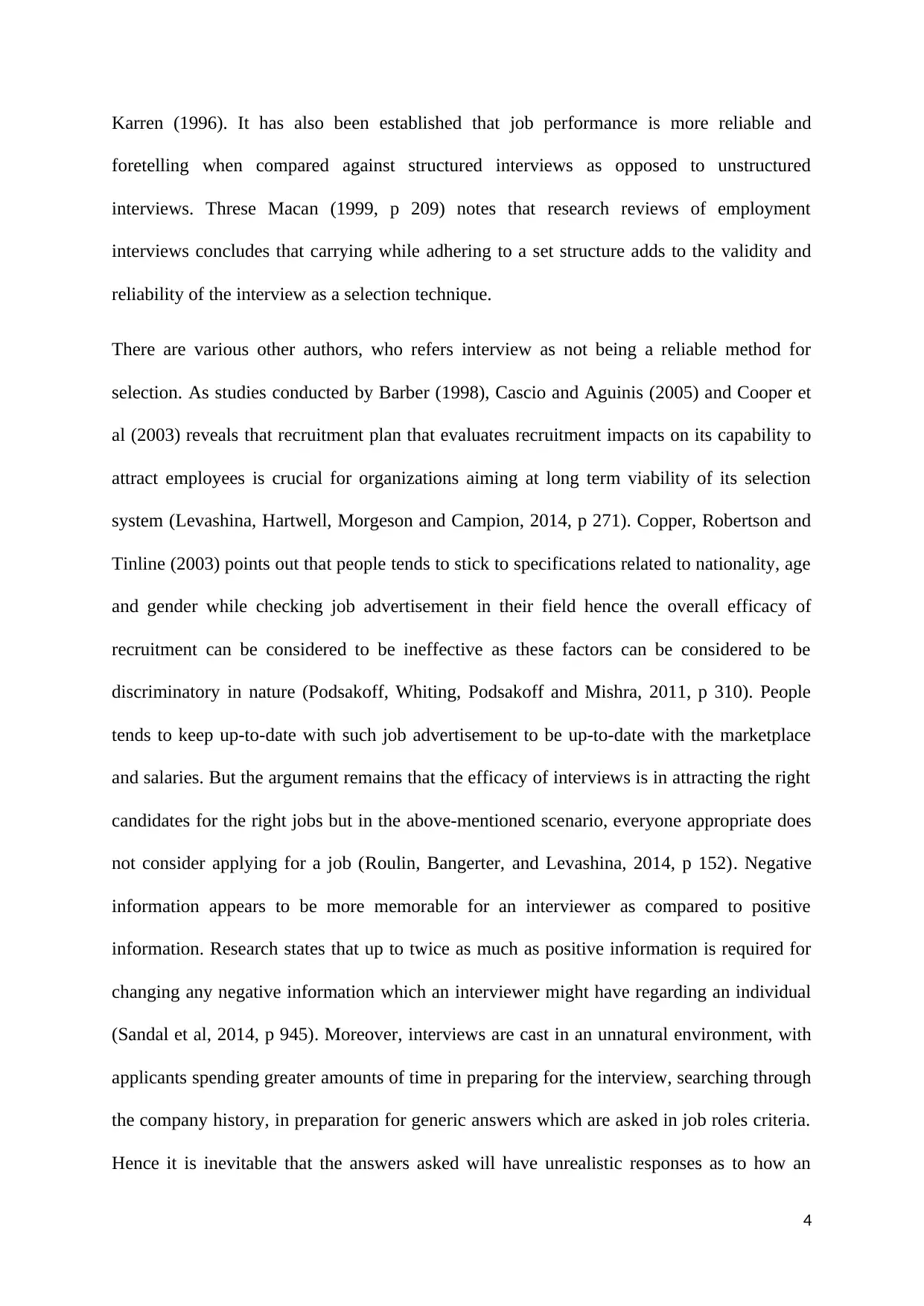
Karren (1996). It has also been established that job performance is more reliable and
foretelling when compared against structured interviews as opposed to unstructured
interviews. Threse Macan (1999, p 209) notes that research reviews of employment
interviews concludes that carrying while adhering to a set structure adds to the validity and
reliability of the interview as a selection technique.
There are various other authors, who refers interview as not being a reliable method for
selection. As studies conducted by Barber (1998), Cascio and Aguinis (2005) and Cooper et
al (2003) reveals that recruitment plan that evaluates recruitment impacts on its capability to
attract employees is crucial for organizations aiming at long term viability of its selection
system (Levashina, Hartwell, Morgeson and Campion, 2014, p 271). Copper, Robertson and
Tinline (2003) points out that people tends to stick to specifications related to nationality, age
and gender while checking job advertisement in their field hence the overall efficacy of
recruitment can be considered to be ineffective as these factors can be considered to be
discriminatory in nature (Podsakoff, Whiting, Podsakoff and Mishra, 2011, p 310). People
tends to keep up-to-date with such job advertisement to be up-to-date with the marketplace
and salaries. But the argument remains that the efficacy of interviews is in attracting the right
candidates for the right jobs but in the above-mentioned scenario, everyone appropriate does
not consider applying for a job (Roulin, Bangerter, and Levashina, 2014, p 152). Negative
information appears to be more memorable for an interviewer as compared to positive
information. Research states that up to twice as much as positive information is required for
changing any negative information which an interviewer might have regarding an individual
(Sandal et al, 2014, p 945). Moreover, interviews are cast in an unnatural environment, with
applicants spending greater amounts of time in preparing for the interview, searching through
the company history, in preparation for generic answers which are asked in job roles criteria.
Hence it is inevitable that the answers asked will have unrealistic responses as to how an
4
foretelling when compared against structured interviews as opposed to unstructured
interviews. Threse Macan (1999, p 209) notes that research reviews of employment
interviews concludes that carrying while adhering to a set structure adds to the validity and
reliability of the interview as a selection technique.
There are various other authors, who refers interview as not being a reliable method for
selection. As studies conducted by Barber (1998), Cascio and Aguinis (2005) and Cooper et
al (2003) reveals that recruitment plan that evaluates recruitment impacts on its capability to
attract employees is crucial for organizations aiming at long term viability of its selection
system (Levashina, Hartwell, Morgeson and Campion, 2014, p 271). Copper, Robertson and
Tinline (2003) points out that people tends to stick to specifications related to nationality, age
and gender while checking job advertisement in their field hence the overall efficacy of
recruitment can be considered to be ineffective as these factors can be considered to be
discriminatory in nature (Podsakoff, Whiting, Podsakoff and Mishra, 2011, p 310). People
tends to keep up-to-date with such job advertisement to be up-to-date with the marketplace
and salaries. But the argument remains that the efficacy of interviews is in attracting the right
candidates for the right jobs but in the above-mentioned scenario, everyone appropriate does
not consider applying for a job (Roulin, Bangerter, and Levashina, 2014, p 152). Negative
information appears to be more memorable for an interviewer as compared to positive
information. Research states that up to twice as much as positive information is required for
changing any negative information which an interviewer might have regarding an individual
(Sandal et al, 2014, p 945). Moreover, interviews are cast in an unnatural environment, with
applicants spending greater amounts of time in preparing for the interview, searching through
the company history, in preparation for generic answers which are asked in job roles criteria.
Hence it is inevitable that the answers asked will have unrealistic responses as to how an
4
Paraphrase This Document
Need a fresh take? Get an instant paraphrase of this document with our AI Paraphraser
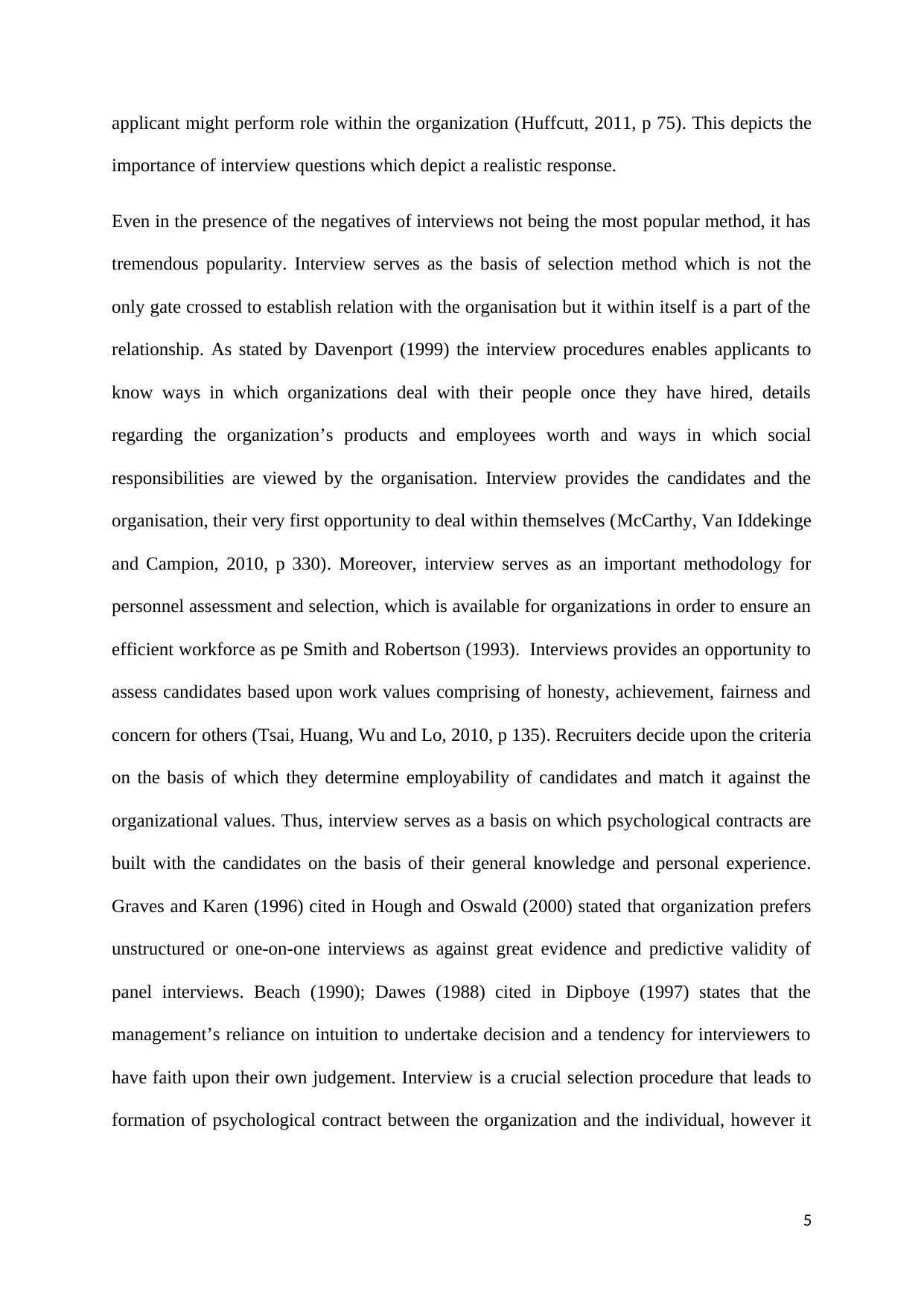
applicant might perform role within the organization (Huffcutt, 2011, p 75). This depicts the
importance of interview questions which depict a realistic response.
Even in the presence of the negatives of interviews not being the most popular method, it has
tremendous popularity. Interview serves as the basis of selection method which is not the
only gate crossed to establish relation with the organisation but it within itself is a part of the
relationship. As stated by Davenport (1999) the interview procedures enables applicants to
know ways in which organizations deal with their people once they have hired, details
regarding the organization’s products and employees worth and ways in which social
responsibilities are viewed by the organisation. Interview provides the candidates and the
organisation, their very first opportunity to deal within themselves (McCarthy, Van Iddekinge
and Campion, 2010, p 330). Moreover, interview serves as an important methodology for
personnel assessment and selection, which is available for organizations in order to ensure an
efficient workforce as pe Smith and Robertson (1993). Interviews provides an opportunity to
assess candidates based upon work values comprising of honesty, achievement, fairness and
concern for others (Tsai, Huang, Wu and Lo, 2010, p 135). Recruiters decide upon the criteria
on the basis of which they determine employability of candidates and match it against the
organizational values. Thus, interview serves as a basis on which psychological contracts are
built with the candidates on the basis of their general knowledge and personal experience.
Graves and Karen (1996) cited in Hough and Oswald (2000) stated that organization prefers
unstructured or one-on-one interviews as against great evidence and predictive validity of
panel interviews. Beach (1990); Dawes (1988) cited in Dipboye (1997) states that the
management’s reliance on intuition to undertake decision and a tendency for interviewers to
have faith upon their own judgement. Interview is a crucial selection procedure that leads to
formation of psychological contract between the organization and the individual, however it
5
importance of interview questions which depict a realistic response.
Even in the presence of the negatives of interviews not being the most popular method, it has
tremendous popularity. Interview serves as the basis of selection method which is not the
only gate crossed to establish relation with the organisation but it within itself is a part of the
relationship. As stated by Davenport (1999) the interview procedures enables applicants to
know ways in which organizations deal with their people once they have hired, details
regarding the organization’s products and employees worth and ways in which social
responsibilities are viewed by the organisation. Interview provides the candidates and the
organisation, their very first opportunity to deal within themselves (McCarthy, Van Iddekinge
and Campion, 2010, p 330). Moreover, interview serves as an important methodology for
personnel assessment and selection, which is available for organizations in order to ensure an
efficient workforce as pe Smith and Robertson (1993). Interviews provides an opportunity to
assess candidates based upon work values comprising of honesty, achievement, fairness and
concern for others (Tsai, Huang, Wu and Lo, 2010, p 135). Recruiters decide upon the criteria
on the basis of which they determine employability of candidates and match it against the
organizational values. Thus, interview serves as a basis on which psychological contracts are
built with the candidates on the basis of their general knowledge and personal experience.
Graves and Karen (1996) cited in Hough and Oswald (2000) stated that organization prefers
unstructured or one-on-one interviews as against great evidence and predictive validity of
panel interviews. Beach (1990); Dawes (1988) cited in Dipboye (1997) states that the
management’s reliance on intuition to undertake decision and a tendency for interviewers to
have faith upon their own judgement. Interview is a crucial selection procedure that leads to
formation of psychological contract between the organization and the individual, however it
5
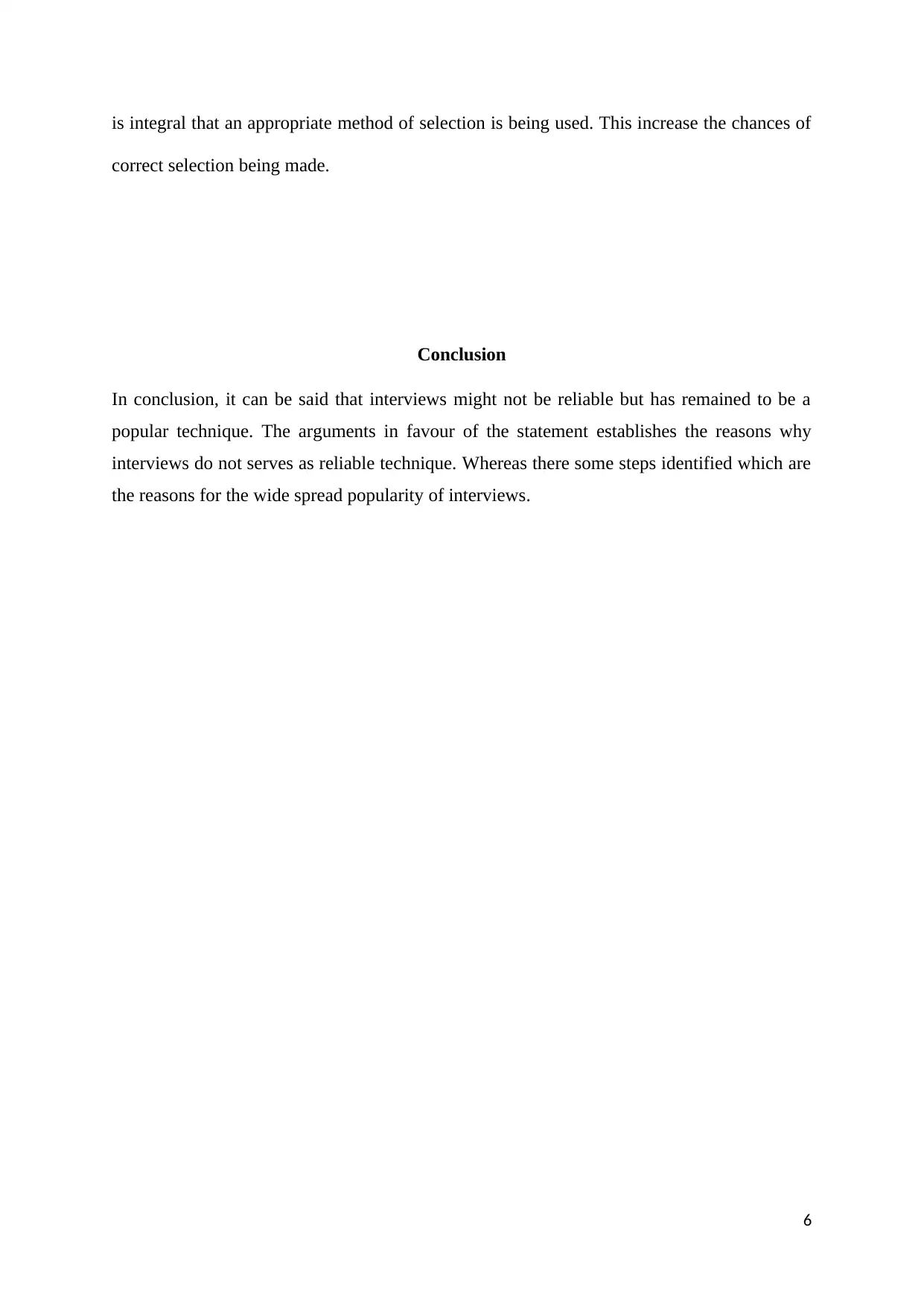
is integral that an appropriate method of selection is being used. This increase the chances of
correct selection being made.
Conclusion
In conclusion, it can be said that interviews might not be reliable but has remained to be a
popular technique. The arguments in favour of the statement establishes the reasons why
interviews do not serves as reliable technique. Whereas there some steps identified which are
the reasons for the wide spread popularity of interviews.
6
correct selection being made.
Conclusion
In conclusion, it can be said that interviews might not be reliable but has remained to be a
popular technique. The arguments in favour of the statement establishes the reasons why
interviews do not serves as reliable technique. Whereas there some steps identified which are
the reasons for the wide spread popularity of interviews.
6
You're viewing a preview
Unlock full access by subscribing today!
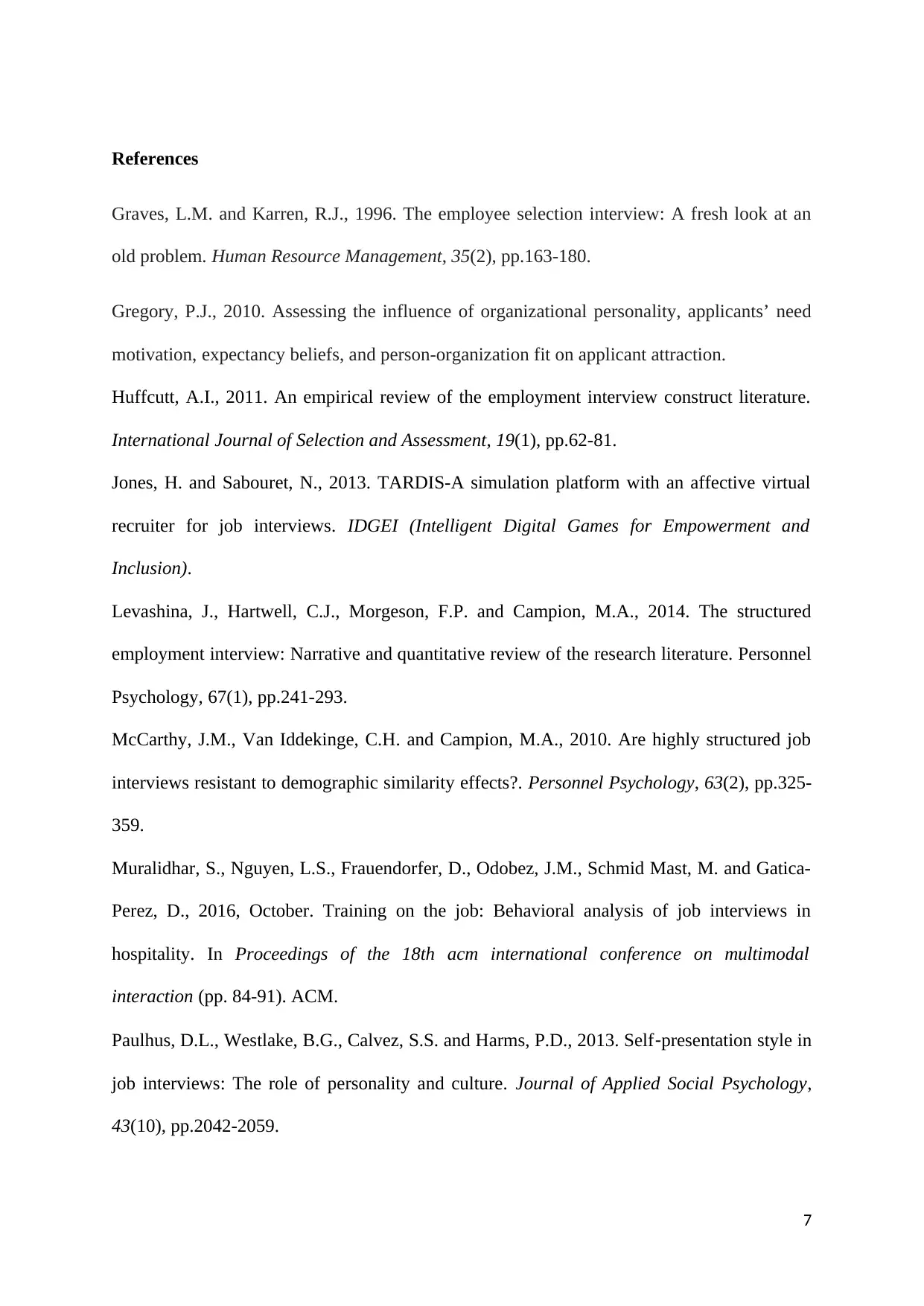
References
Graves, L.M. and Karren, R.J., 1996. The employee selection interview: A fresh look at an
old problem. Human Resource Management, 35(2), pp.163-180.
Gregory, P.J., 2010. Assessing the influence of organizational personality, applicants’ need
motivation, expectancy beliefs, and person-organization fit on applicant attraction.
Huffcutt, A.I., 2011. An empirical review of the employment interview construct literature.
International Journal of Selection and Assessment, 19(1), pp.62-81.
Jones, H. and Sabouret, N., 2013. TARDIS-A simulation platform with an affective virtual
recruiter for job interviews. IDGEI (Intelligent Digital Games for Empowerment and
Inclusion).
Levashina, J., Hartwell, C.J., Morgeson, F.P. and Campion, M.A., 2014. The structured
employment interview: Narrative and quantitative review of the research literature. Personnel
Psychology, 67(1), pp.241-293.
McCarthy, J.M., Van Iddekinge, C.H. and Campion, M.A., 2010. Are highly structured job
interviews resistant to demographic similarity effects?. Personnel Psychology, 63(2), pp.325-
359.
Muralidhar, S., Nguyen, L.S., Frauendorfer, D., Odobez, J.M., Schmid Mast, M. and Gatica-
Perez, D., 2016, October. Training on the job: Behavioral analysis of job interviews in
hospitality. In Proceedings of the 18th acm international conference on multimodal
interaction (pp. 84-91). ACM.
Paulhus, D.L., Westlake, B.G., Calvez, S.S. and Harms, P.D., 2013. Self‐presentation style in
job interviews: The role of personality and culture. Journal of Applied Social Psychology,
43(10), pp.2042-2059.
7
Graves, L.M. and Karren, R.J., 1996. The employee selection interview: A fresh look at an
old problem. Human Resource Management, 35(2), pp.163-180.
Gregory, P.J., 2010. Assessing the influence of organizational personality, applicants’ need
motivation, expectancy beliefs, and person-organization fit on applicant attraction.
Huffcutt, A.I., 2011. An empirical review of the employment interview construct literature.
International Journal of Selection and Assessment, 19(1), pp.62-81.
Jones, H. and Sabouret, N., 2013. TARDIS-A simulation platform with an affective virtual
recruiter for job interviews. IDGEI (Intelligent Digital Games for Empowerment and
Inclusion).
Levashina, J., Hartwell, C.J., Morgeson, F.P. and Campion, M.A., 2014. The structured
employment interview: Narrative and quantitative review of the research literature. Personnel
Psychology, 67(1), pp.241-293.
McCarthy, J.M., Van Iddekinge, C.H. and Campion, M.A., 2010. Are highly structured job
interviews resistant to demographic similarity effects?. Personnel Psychology, 63(2), pp.325-
359.
Muralidhar, S., Nguyen, L.S., Frauendorfer, D., Odobez, J.M., Schmid Mast, M. and Gatica-
Perez, D., 2016, October. Training on the job: Behavioral analysis of job interviews in
hospitality. In Proceedings of the 18th acm international conference on multimodal
interaction (pp. 84-91). ACM.
Paulhus, D.L., Westlake, B.G., Calvez, S.S. and Harms, P.D., 2013. Self‐presentation style in
job interviews: The role of personality and culture. Journal of Applied Social Psychology,
43(10), pp.2042-2059.
7
Paraphrase This Document
Need a fresh take? Get an instant paraphrase of this document with our AI Paraphraser
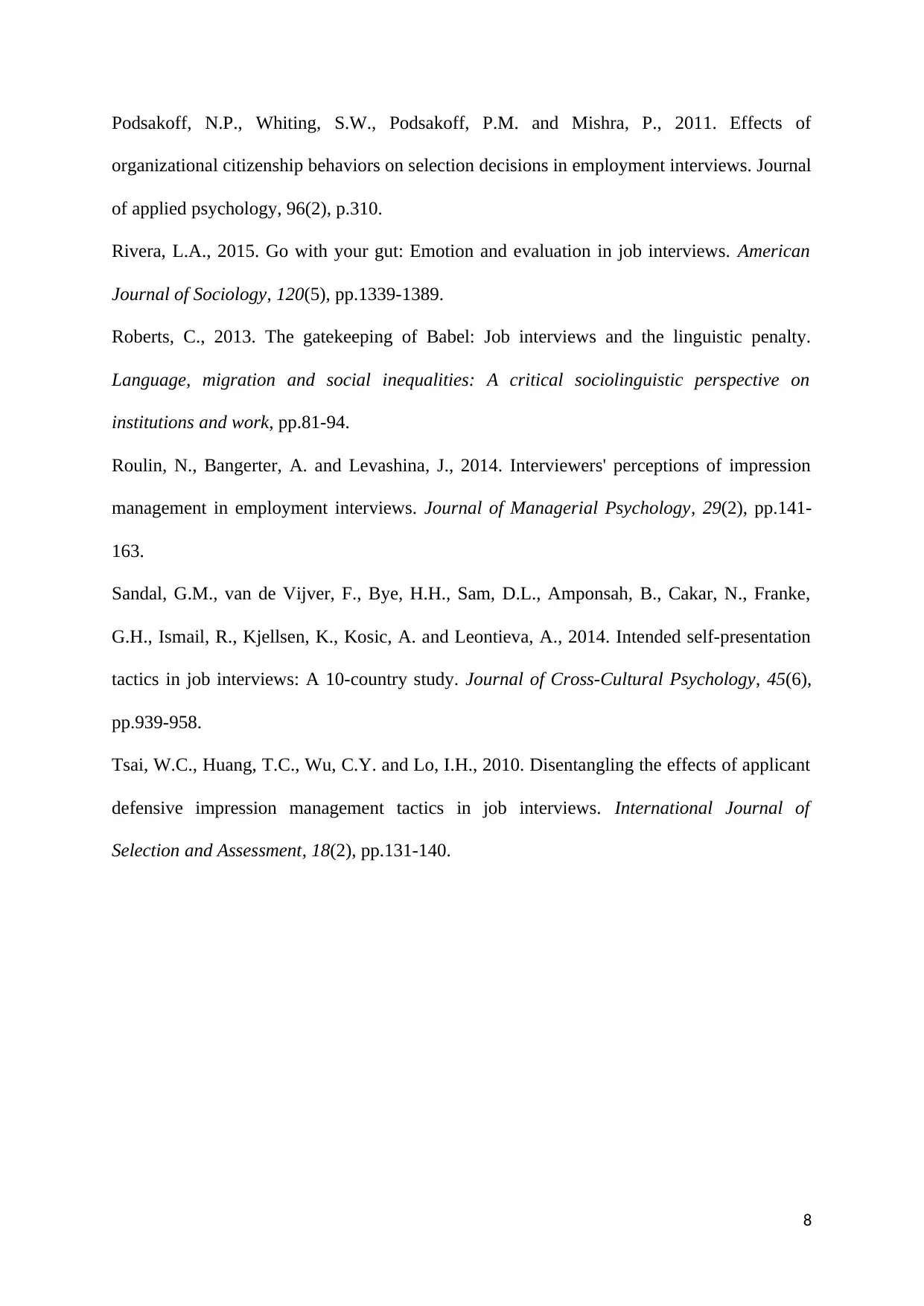
Podsakoff, N.P., Whiting, S.W., Podsakoff, P.M. and Mishra, P., 2011. Effects of
organizational citizenship behaviors on selection decisions in employment interviews. Journal
of applied psychology, 96(2), p.310.
Rivera, L.A., 2015. Go with your gut: Emotion and evaluation in job interviews. American
Journal of Sociology, 120(5), pp.1339-1389.
Roberts, C., 2013. The gatekeeping of Babel: Job interviews and the linguistic penalty.
Language, migration and social inequalities: A critical sociolinguistic perspective on
institutions and work, pp.81-94.
Roulin, N., Bangerter, A. and Levashina, J., 2014. Interviewers' perceptions of impression
management in employment interviews. Journal of Managerial Psychology, 29(2), pp.141-
163.
Sandal, G.M., van de Vijver, F., Bye, H.H., Sam, D.L., Amponsah, B., Cakar, N., Franke,
G.H., Ismail, R., Kjellsen, K., Kosic, A. and Leontieva, A., 2014. Intended self-presentation
tactics in job interviews: A 10-country study. Journal of Cross-Cultural Psychology, 45(6),
pp.939-958.
Tsai, W.C., Huang, T.C., Wu, C.Y. and Lo, I.H., 2010. Disentangling the effects of applicant
defensive impression management tactics in job interviews. International Journal of
Selection and Assessment, 18(2), pp.131-140.
8
organizational citizenship behaviors on selection decisions in employment interviews. Journal
of applied psychology, 96(2), p.310.
Rivera, L.A., 2015. Go with your gut: Emotion and evaluation in job interviews. American
Journal of Sociology, 120(5), pp.1339-1389.
Roberts, C., 2013. The gatekeeping of Babel: Job interviews and the linguistic penalty.
Language, migration and social inequalities: A critical sociolinguistic perspective on
institutions and work, pp.81-94.
Roulin, N., Bangerter, A. and Levashina, J., 2014. Interviewers' perceptions of impression
management in employment interviews. Journal of Managerial Psychology, 29(2), pp.141-
163.
Sandal, G.M., van de Vijver, F., Bye, H.H., Sam, D.L., Amponsah, B., Cakar, N., Franke,
G.H., Ismail, R., Kjellsen, K., Kosic, A. and Leontieva, A., 2014. Intended self-presentation
tactics in job interviews: A 10-country study. Journal of Cross-Cultural Psychology, 45(6),
pp.939-958.
Tsai, W.C., Huang, T.C., Wu, C.Y. and Lo, I.H., 2010. Disentangling the effects of applicant
defensive impression management tactics in job interviews. International Journal of
Selection and Assessment, 18(2), pp.131-140.
8
1 out of 8
Related Documents
Your All-in-One AI-Powered Toolkit for Academic Success.
+13062052269
info@desklib.com
Available 24*7 on WhatsApp / Email
![[object Object]](/_next/static/media/star-bottom.7253800d.svg)
Unlock your academic potential
© 2024 | Zucol Services PVT LTD | All rights reserved.



